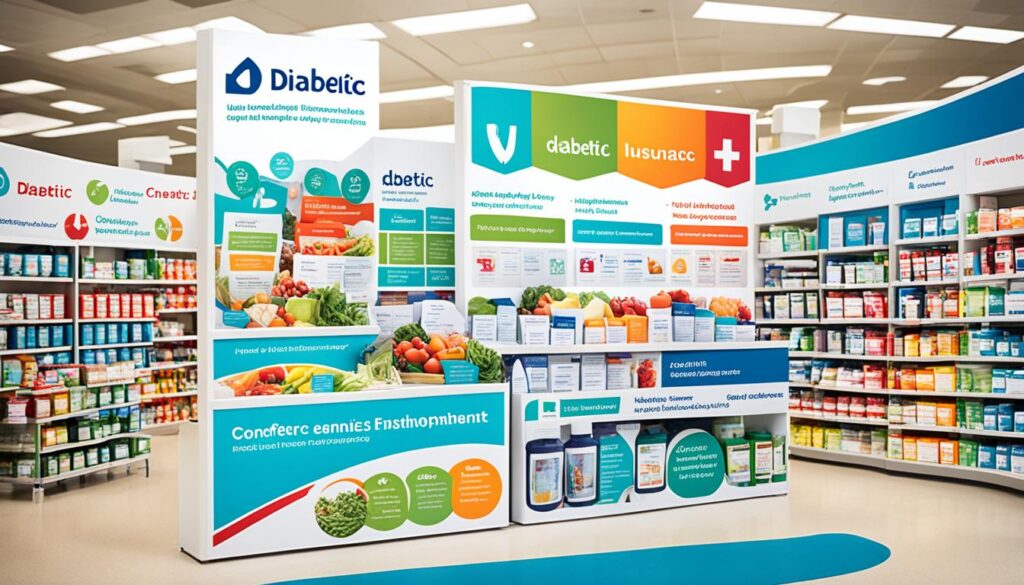Health insurance is an essential component of diabetes care, enabling diabetic patients to access the necessary supplies, medications, education, and healthcare services to effectively manage their condition. With adequate and affordable coverage, individuals with diabetes can prevent complications and lead healthier lives.

Key Takeaways:
- Health insurance is crucial for diabetic patients to support their diabetes management and prevent complications.
- The Affordable Care Act has improved access to health insurance for individuals with diabetes.
- Many pharmaceutical companies offer financial assistance programs for diabetes medications and supplies.
- Diabetic patients have various health insurance options, including the insurance marketplace and private health insurance.
- Health insurance provides access to essential diabetes supplies, regular check-ups, preventive care, and education.
Health Insurance Options for Diabetic Patients
Diabetic patients have several health insurance options to consider when seeking coverage for their healthcare needs. These options include purchasing a plan through the health insurance marketplace, enrolling in a government health insurance program, or obtaining private health insurance.
Also Read : Blossoming Protection: Maternity Health Insurance For Expecting Mothers
“Having access to affordable health insurance is essential for diabetic patients to manage their condition effectively and ensure they receive the necessary care and support.”
One option is to purchase a health insurance plan through the health insurance marketplace. The insurance marketplace offers various private health insurance options that cater to the specific needs of diabetic patients. This platform provides individuals and families with a range of plans to choose from, allowing them to select coverage that aligns with their budget and healthcare requirements.
Also Read : Senior Care Assurance: Navigating Senior Citizen Health Insurance
Diabetic patients may also be eligible for coverage through government health insurance programs. Medicaid is a state-administered program that provides health insurance to individuals and families with low incomes. This program ensures that diabetic patients have access to the necessary healthcare services and medications they need to manage their condition effectively.
Also Read : One Plan, Many Benefits: Discovering The 1 Core Health Insurance Plan
Medicare is another option for diabetic patients. It is a federal health insurance program that primarily caters to individuals aged 65 and older, as well as those under 65 with disabilities. Diabetic patients who meet the eligibility criteria can enroll in Medicare to receive comprehensive health insurance coverage.
Also Read : Prioritize Your Health: Individual Health Insurance Choices
Private health insurance plans are also available for diabetic patients. These plans can be obtained through an employer-sponsored health plan or by purchasing an individual insurance policy. Private health insurance offers flexibility in terms of coverage options and network of healthcare providers, allowing diabetic patients to tailor their insurance plan to their specific needs.
Also Read : Secure Your Family’s Health With Comprehensive Health Insurance Coverage
It is crucial for diabetic patients to explore these health insurance options and carefully consider the benefits and coverage provided by each plan. By choosing the most suitable health insurance program, diabetic patients can ensure they have comprehensive coverage for their healthcare needs and receive the necessary support to effectively manage their condition.
| Health Insurance Options | Key Features |
|---|---|
| Health Insurance Marketplace | – Wide range of private health insurance options – Ability to compare plans and choose the best fit – Affordability options and financial assistance |
| Medicaid | – Coverage for individuals and families with low incomes – Access to essential healthcare services – Assistance with managing diabetes medications |
| Medicare | – Federal health insurance program for seniors and individuals with disabilities – Comprehensive coverage for diabetic-related services and supplies – Flexibility to choose between different Medicare plans |
| Private Health Insurance | – Employer-sponsored or individual insurance plans – Customizable coverage options – Wide network of healthcare providers |
The Benefits of Health Insurance for Diabetic Patients
Health insurance plays a crucial role in supporting the management of diabetes. It provides access to essential diabetes supplies such as test strips, meters, and insulin. Additionally, health insurance coverage allows diabetic patients to receive regular check-ups, screenings, and preventive care to monitor their condition and prevent complications. With health insurance, diabetic patients can also access education and support services to learn how to effectively manage their diabetes and improve their overall health.
Managing diabetes requires consistent monitoring and access to necessary supplies. Health insurance ensures that diabetic patients have the means to acquire essential diabetes supplies, such as glucose test strips, lancets, and blood glucose meters. These supplies are vital for monitoring blood sugar levels and making informed decisions about diet, exercise, and medication.
Regular check-ups and screenings are essential in managing diabetes and preventing complications. With health insurance coverage, diabetic patients can schedule routine visits to their healthcare providers to monitor their blood sugar levels, check for any potential complications, and receive necessary vaccinations. These preventive measures help identify potential issues early on, allowing for prompt intervention and minimizing the risk of further complications.
“Health insurance coverage allows diabetic patients to receive regular check-ups, screenings, and preventive care to monitor their condition and prevent complications.”
Health insurance not only provides access to medical care but also offers educational resources and support services for diabetic patients. Many health insurance plans cover diabetes self-management education, which helps patients learn about proper nutrition, exercise, medication management, and monitoring techniques. These education programs empower diabetic patients to take control of their condition and make informed decisions to improve their overall health and well-being.
In addition, health insurance can connect diabetic patients with support groups and counseling services, allowing them to seek emotional support and gain valuable insights from others who share similar experiences. Emotional well-being plays a significant role in diabetes management, and having access to mental health resources can greatly enhance a patient’s ability to cope with the challenges of living with diabetes.
Overall, health insurance provides diabetic patients with the necessary tools and resources to effectively manage their condition and prevent complications. It ensures access to vital diabetes supplies, regular check-ups, preventive care, education, and support services. By prioritizing health insurance coverage, diabetic patients can take control of their diabetes management and lead healthier lives.

Health Insurance Marketplace for Diabetic Patients
The health insurance marketplace is a valuable resource for diabetic patients looking to buy a health insurance plan that suits their specific needs. This marketplace provides a range of options and benefits, ensuring individuals and families can find the right coverage to support their healthcare requirements.
One of the key advantages of the health insurance marketplace is the open enrollment period, which typically runs from November to January. During this time, diabetic patients can compare and purchase health insurance plans. Open enrollment allows individuals to select the most suitable plan, ensuring they have the coverage necessary to manage their diabetes effectively.
Financial help is available through the marketplace to lower monthly premiums and out-of-pocket costs for eligible individuals. This assistance can make health insurance plans more affordable and accessible for diabetic patients, ensuring they receive the care and support they need without undue financial strain.
To take advantage of the health insurance marketplace, diabetic patients should explore the available plans and consider their healthcare requirements. It is crucial to assess the coverage options, including diabetes-related services and supplies, to find a plan that meets their specific needs. By utilizing the health insurance marketplace, diabetic patients can access the financial help and resources necessary to buy a plan tailored to their healthcare needs.
Benefits of the Health Insurance Marketplace for Diabetic Patients:
- Access to a wide range of health insurance plans
- Open enrollment period to choose suitable coverage
- Financial help to lower monthly premiums and out-of-pocket costs
- Options for diabetes-related services and supplies
- Opportunity to compare and select the best plan for individual needs
| Health Insurance Marketplace for Diabetic Patients |
|---|
 |
Choosing the Right Health Insurance Plan for Diabetic Patients
When it comes to managing your diabetes, selecting the right health insurance plan is essential. It’s crucial to carefully consider your needs and preferences to ensure that you choose a plan that provides the coverage and support you require. There are several factors to consider during the decision-making process:
1. Insurance Premiums
Insurance premiums refer to the amount you pay each month for your health insurance coverage. When comparing plans, evaluate the monthly premiums and consider how they fit within your budget. Keep in mind that lower premiums may result in higher out-of-pocket costs, so strike a balance that suits your financial situation.
2. Out-of-Pocket Costs
Out-of-pocket costs encompass the expenses you are responsible for paying when receiving healthcare services. This includes deductibles, copayments, and coinsurance. Assess the out-of-pocket costs associated with each health insurance plan you are considering, and determine if they align with your anticipated medical needs and budget.
3. Coverage for Diabetes
As a diabetic patient, it is paramount to choose a health insurance plan that provides coverage for diabetes-related services and supplies. This includes medications, devices, and services such as insulin, blood glucose meters, test strips, and diabetes education programs. Carefully review the coverage details outlined in each plan’s documentation to ensure that your essential diabetes needs are met.
4. Network of Healthcare Providers
The network of healthcare providers refers to the doctors, specialists, and hospitals that are contracted with your health insurance company. Before finalizing your decision, ensure that your preferred healthcare providers are included in the plan’s network. Having access to the healthcare professionals you trust is crucial for effective diabetes management.
“Choosing the right health insurance plan is a critical decision for diabetic patients. By carefully evaluating insurance premiums, out-of-pocket costs, and coverage for diabetes, individuals can ensure they have the necessary support and resources to effectively manage their condition.”
To assist you in comparing different health insurance plans, use the table below:
| Health Insurance Provider | Monthly Premiums | Out-of-Pocket Costs | Coverage for Diabetes | Network of Healthcare Providers |
|---|---|---|---|---|
| Provider A | $$ | $$$ | Yes | Extensive |
| Provider B | $$$ | $$ | Yes | Limited |
| Provider C | $$ | $$ | No | Extensive |
Remember, the decision-making process should be based on your unique needs and requirements. Take the time to compare plans, review the available information, and consult with healthcare professionals if needed. By selecting the right health insurance plan for your diabetes management, you can ensure you have the necessary resources and support to live a healthy and fulfilling life.

Government Programs for Diabetic Patients
Diabetic patients have access to government programs that provide health insurance coverage. These programs offer different options to ensure diabetic patients can manage their condition effectively and access the necessary healthcare services.
Medicaid
One such program is Medicaid, which is a state-administered health insurance program. Medicaid offers health coverage for individuals and families with low incomes. Eligible diabetic patients can receive comprehensive healthcare services at an affordable cost through Medicaid. This program is particularly beneficial for those who may not be able to afford private health insurance.
Medicare
Another government program is Medicare, a federal health insurance program designed for individuals aged 65 and older, as well as those with certain disabilities. Diabetic patients who qualify for Medicare can access a range of healthcare services, including diabetes management, preventive care, and prescription drug coverage. Medicare helps diabetic patients receive the care they need to effectively manage their condition.
Veterans Health
Veterans of the United States armed forces may be eligible for health insurance benefits through the Department of Veterans Affairs (VA). The VA provides comprehensive healthcare services to veterans, including diabetes care and management. Diabetic veterans can access specialized care, medications, and support through the VA. The program is designed to meet the unique healthcare needs of veterans.
These government programs play a crucial role in ensuring that diabetic patients have access to affordable health insurance coverage. Whether it’s through Medicaid, Medicare, or veterans health benefits, these programs provide vital support to help diabetic patients manage their condition and maintain their overall health.
To learn more about these programs, consider contacting your local Medicaid office, Medicare representative, or the Department of Veterans Affairs. They can provide you with detailed information on eligibility criteria and the specific benefits available.
Health Insurance Terms and Glossary
Understanding health insurance terms and terminology is essential for diabetic patients when navigating the healthcare system. A glossary of health insurance terms can help diabetic patients comprehend the different components of their health insurance plan, including deductibles, co-pays, premiums, network, and more. Having a clear understanding of these terms enables diabetic patients to make informed decisions about their health insurance coverage and effectively utilize their benefits. Diabetic patients should also be prepared with relevant questions when discussing health insurance options with insurance providers or healthcare professionals.
Glossary of Health Insurance Terms
| Term | Definition |
|---|---|
| Deductibles | The amount of money an individual must pay out-of-pocket for healthcare services before the insurance company starts covering the expenses. |
| Co-pays | A fixed amount that an insured individual must pay at the time of receiving healthcare services, such as doctor visits or prescription medications. |
| Premiums | The amount of money an individual pays on a regular basis to maintain their health insurance coverage. Premiums are typically paid monthly. |
| Network | The group of hospitals, doctors, and other healthcare providers that have agreed to provide services to individuals covered by a specific health insurance plan. |
| Out-of-pocket costs | The expenses that an individual must pay for medical services and prescriptions that are not covered by their health insurance plan. |
| Pre-existing condition | A health condition that exists before the individual’s health insurance coverage begins. Under the Affordable Care Act, health insurance plans cannot deny coverage or charge higher premiums based on pre-existing conditions such as diabetes. |
| Open enrollment | The period of time during which individuals can sign up for or make changes to their health insurance plans. Outside of open enrollment, individuals may only be able to enroll or make changes if they experience a qualifying life event. |
Having a practical understanding of these health insurance terms can empower diabetic patients to navigate their health insurance coverage more confidently and effectively. It enables them to comprehend the financial aspects, coverage limitations, and benefits associated with their health insurance plan. Moreover, being knowledgeable about these terms also allows them to articulate their questions and concerns clearly when communicating with insurance providers or healthcare professionals.
When discussing health insurance options, diabetic patients should ask specific questions to ensure they choose the right plan for their needs. Here are some relevant questions to consider:
- Does the health insurance plan cover all necessary diabetes supplies, medications, and services?
- What are the deductibles, co-pays, and out-of-pocket costs associated with the health insurance plan?
- Is the preferred healthcare provider or specialist included in the plan’s network?
- Does the plan provide coverage for additional services such as diabetes education programs or nutrition counseling?
- What financial assistance options are available to help with the costs of health insurance premiums and out-of-pocket expenses?
By familiarizing themselves with health insurance terms and asking relevant questions, diabetic patients can make informed choices and access the most suitable health insurance plan for their diabetes management and overall well-being.

Financial Assistance and Discounts for Diabetic Patients
Diabetic patients often face financial challenges in managing their healthcare and medication expenses. Fortunately, there are various options available to provide financial assistance and discounts to alleviate the burden. These programs aim to make essential medications and healthcare more accessible and affordable for individuals with diabetes.
Prescription Assistance Programs
Many pharmaceutical companies offer prescription assistance programs specifically designed to help individuals who have difficulty affording their diabetes medications and supplies. These programs provide eligible patients with financial support, discounts, or even free medications. Eligibility criteria may vary, but these programs can significantly reduce the financial strain of managing diabetes.
Financial Help from the Health Insurance Marketplace
Diabetic patients may also be eligible for financial help from the Health Insurance Marketplace. The Marketplace offers subsidies and premium tax credits to lower monthly premiums and out-of-pocket costs for eligible individuals. This assistance can make health insurance coverage more affordable and accessible, providing essential financial relief for diabetic patients.
Cost-Sharing Help for Essential Health Benefits
To further support diabetic patients, cost-sharing help is available to reduce out-of-pocket expenses associated with essential health benefits. Deductibles, co-pays, and other expenses can be significantly reduced or eliminated through cost-sharing programs. This ensures that diabetic patients can access the necessary healthcare services and supplies without incurring excessive financial burdens.
To take advantage of these financial assistance options, diabetic patients should actively explore and research the various programs available. Seeking guidance from healthcare professionals, insurance providers, and diabetes support organizations can also provide valuable insights and assistance in navigating these resources.

Managing diabetes can be financially challenging, but with the help of available assistance programs, diabetic patients can alleviate some of the financial burden associated with their condition. By taking advantage of these programs, individuals with diabetes can focus on their health and well-being without worrying about the financial aspects of their care.
Benefits of Health Insurance for Diabetes Management
Health insurance plays a vital role in diabetes management, providing access to a wide range of healthcare services and programs. Diabetic patients can take advantage of various preventive care services that are essential for diabetes care. Regular screenings, vaccinations, and diabetes education programs aid in early detection and prevention of complications, helping individuals proactively manage their health. Moreover, health insurance supports chronic disease management by ensuring access to comprehensive care.
“Health insurance provides diabetic patients with the means to regularly visit doctors, enabling effective medication management and specialized treatments for their condition.”
With affordable access to health care services, diabetic patients can have regular doctor visits to monitor their progress, make necessary adjustments to their treatment plans, and receive specialized treatments when required. Comprehensive healthcare coverage allows individuals to address their specific needs while managing their condition, leading to improved health outcomes.
Also Read:- Best Pet Insurance Plans for Your Furry Friends
To visually illustrate the benefits of health insurance for diabetes management, here is a table highlighting key factors:
| Benefits of Health Insurance for Diabetes Management | Explanation |
|---|---|
| 1. Access to Preventive Care Services | Regular screenings, vaccinations, and diabetes education programs help prevent complications and improve overall health. |
| 2. Regular Doctor Visits | Frequent check-ups enable effective medication management, specialized treatments, and adjustments to treatment plans. |
| 3. Comprehensive Care Coverage | Access to a wide range of healthcare services tailored to the specific needs of diabetic patients. |
By maximizing the benefits of their health insurance coverage, diabetic patients can effectively manage their condition, improve their overall health, and reduce the risk of complications.
Diabetes Prevention Programs
In addition to managing diabetes, health insurance also supports programs aimed at diabetes prevention. Diabetes prevention programs provide valuable resources and guidance to individuals at risk of developing diabetes. These programs focus on lifestyle modifications, such as healthy eating, physical activity, and weight management, to reduce the risk of developing type 2 diabetes.
Diabetes prevention programs can be accessed through health insurance coverage, empowering individuals to make positive changes in their lifestyle and reduce their diabetes risk.
Conclusion
Adequate and affordable health insurance is crucial for the well-being of diabetic patients. It enables access to essential supplies, medications, education, and healthcare services necessary for effective diabetes management. With the implementation of the Affordable Care Act and the establishment of Health Insurance Marketplaces, diabetic patients have greater opportunities to find and purchase suitable health insurance plans. By understanding their options and choosing the right plan, diabetic patients can ensure they receive the necessary care and support to lead healthier lives.
FAQs
A: Health insurance for people with diabetes can vary depending on the type of plan they have. Some plans may offer comprehensive coverage for diabetes care, while others may have limitations or exclusions.
Q: How can private health insurance help individuals living with diabetes?
A: Private health insurance can provide access to necessary medical care, including appointments with healthcare providers, medications, and supplies needed to manage diabetes effectively.
Q: What are the options for individuals with diabetes who are without health insurance?
A: People with diabetes who do not have health insurance may explore state health insurance programs, affordable care options, or seek assistance through programs like the Children’s Health Insurance Program (CHIP).
Q: Do all insurance plans cover diabetes treatment?
A: Not all insurance plans cover diabetes treatment equally. It is important for individuals with diabetes to carefully review their insurance policy to understand what is covered and any associated costs.
Q: How can individuals choose the best health insurance plan for diabetes care?
A: When selecting a health insurance plan for diabetes care, individuals should consider factors such as coverage for medications, medical supplies, specialist visits, and diabetes management programs. It is recommended to compare different plans to find one that meets their needs.
Q: What resources are available to help individuals with diabetes navigate changes in health insurance coverage?
A: Organizations like the American Diabetes Association and the National Institute of Diabetes and Digestive and Kidney Diseases offer information and resources to assist individuals with diabetes in understanding and managing changes in health insurance coverage.
Q: Can individuals with type 1 and type 2 diabetes benefit from high-deductible health plans?
A: Some individuals with type 1 or type 2 diabetes may find high-deductible health plans beneficial, especially if they have lower healthcare costs and can take advantage of the tax benefits associated with Health Savings Accounts (HSAs).

